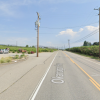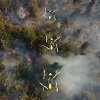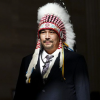This is the same advice UBC Okanagan economist Ross Hickey would give his teenage daughter if she's dumped by her boyfriend.
"Do nothing," said Hickey, who was on the 'Tariff Threat Response' panel at the university on Wednesday.
"Don't harass him. Don't bad-mouth him. Don't pursue him. Dust yourself off and make yourself more attractive to other suitors."
It's the economist's spurned-lover analogy for Canada forgoing retaliatory tariffs in response to President Donald Trump's punitive 25% tariffs on all Canadian goods exported to the US.
.png)
"At the risk of being called a traitor, I'm saying retaliatory tariffs are not the answer," said Hickey.
So, just as he would advise his daughter, the economist recommends Canada not lash out, but rather make improvements at home and find other trading allies.

Nick Arkle, CEO of Gorman Brothers Lumber in West Kelowna, agreed with Hickey's do-nothing solution.
"(Retaliatory tariffs against the US) is poking the proverbial bear," he said.
"The US needs Canada's wood, so our efforts will be to work directly with our US customers to share the burden of this situation."
When the US slapped Canada with 25% tariffs yesterday, Canada immediately struck back with the same.
.png)
"It's created an environment that's eerily similar to the start of COVID," said fellow panelist Barry Penner, CEO of the Energy Futures Institute.
"And just as COVID changed consumer behaviour on a dime, so will tariffs."
Penner said the Trump tariffs show malice to Canada and the rest of the world and hurt the US, too, so he doesn't understand why the US is doing it.
But that doesn't change the fact that BC is a net importer of electricity from the US, much of it generated with fossil fuels.
BC climate-change policy doesn't allow fossil fuels to generate electricity in favour of running water hydro electricity.
"BC should immediately be able to use BC natural gas to create electricity to reduce our reliance on the US and increase our economic resiliency," said Penner.
Panelist John Lambris from Star Produce said his company is being pragmatic and is buying around the US by importing fruits and vegetables from other countries and supporting domestic supply.
Panelist Grant Stevens is from KF Aerospace, Kelowna's largest private-sector employer.
"Aviation is a global industry," he said.
"Parts manufactured in Canada are exported to the US and we import parts from the US as well. The first thing we can do is to find suppliers outside of the US. That may mean doing more work with Airbus (a European consortium) rather than Boeing (a US company)."
Stevens admitted people are scared by the trade war and when people are scared they stop buying, businesses and the economy suffers and layoffs happen.
"It's like being put in a blender and Trump turning it up to 10," he said.
Accountant and consultant Heather Weber from MNP was also a panelist.
"Our top priority is to help our clients navigate tariffs and become more resilient," she said.
"There's an opportunity to go back to basics here and determine how we can be more efficient with operations, supply chains and customers. Look for opportunities within Canada and outside the US for both suppliers and customers."








.png)

.png)







